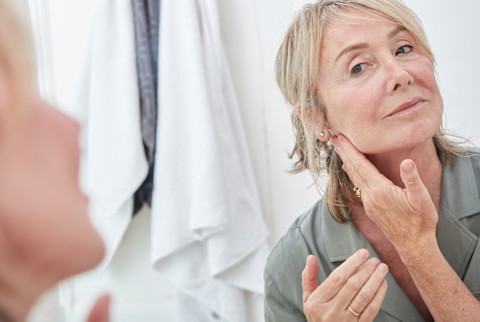
Whether you're going through menopause, starting or stopping hormonal contraception, or just experiencing more hormone fluctuations than usual, your skin may begin to shift. This could manifest as hormonal acne, melasma, textural changes, and the list goes on.
With all of this in mind, it can be overwhelming to figure out how, exactly, to tend to your skin during these times. Good news! Here are three expert-backed ways to do just that. Everyone's bodies are different, but these tips below can certainly get you started:
Start using acne-healing ingredients
If you're struggling with hormonal acne or clogged pores, then you'll want to add some active ingredients to your topical routine if you don't include them already. Look for products with salicylic acid, gentle retinol, and niacinamide.
You'll then want to cushion those actives with barrier-supporting hydrators, like hyaluronic acid, ceramides, peptides, as well as noncomedogenic oils, like rosehip seed oil and grapeseed oil. This way, your skin has time to recover from the intense actives. Not sure how to work all of them into one routine? You may want to opt for skin cycling—here's everything you need to know.
For those with access to a dermatologist, it's worth a visit to see how they can support you during this time of hormonal fluctuations, be it with topical products, in-office treatments, or oral medications.
Take a collagen supplement
Collagen supplements are never a bad idea for supporting skin health, but they're especially helpful during menopause. This particular hormonal shift is famously associated with a drop in collagen: Your collagen levels naturally fall about 1% a year1 once you enter your mid-20s, but once you hit menopause, you experience a 30% drop in collagen in the first five years, with a 2% dip every year after that.
Considering collagen is what literally holds your skin together (making it appear firm and taut), this stark decline can come with some notable changes—namely, wrinkles and sagging.
The solution: Add a collagen supplement to your routine. Look for a blend with hydrolyzed collagen peptides, as this form is better able to support skin elasticity and dermal collagen density2, research shows.
How? Well, hydrolyzed collagen peptides have been shown to help promote the body's natural production of collagen1 and other molecules that make up the skin, like elastin and fibrillin. If you want to take the guesswork out of finding a worthy supplement, check out this curated list of the very best picks from a nutrition Ph.D.
Prioritize sleep
Hormonal imbalances can impact your quality of sleep, which is why it's even more important to prioritize rest during these times. How is this correlated to your skin health, you may wonder? Well, if you lose sleep night after night, that deprivation can induce oxidative stress and lower your antioxidant defenses, making the body (and skin) vulnerable to oxidative damage.
Not to mention, losing sleep increases cortisol (the infamous stress hormone), which can break down collagen over time—research has demonstrated a link between shut-eye and collagen production3, which is why many experts consider sleep a vital part of any "anti-aging" skin routine.
In short, they don't call it "beauty sleep" for nothing. Scan through this list for expert-backed tips to sleep better.
The takeaway
Your hormones fluctuate throughout your life, and some changes may show up on your skin as well. To encourage healthy skin during these times, prioritize acne-healing ingredients, collagen support, and high-quality sleep. Want more tips for tending to skin during menopause? Here's our breakdown of the topic.

